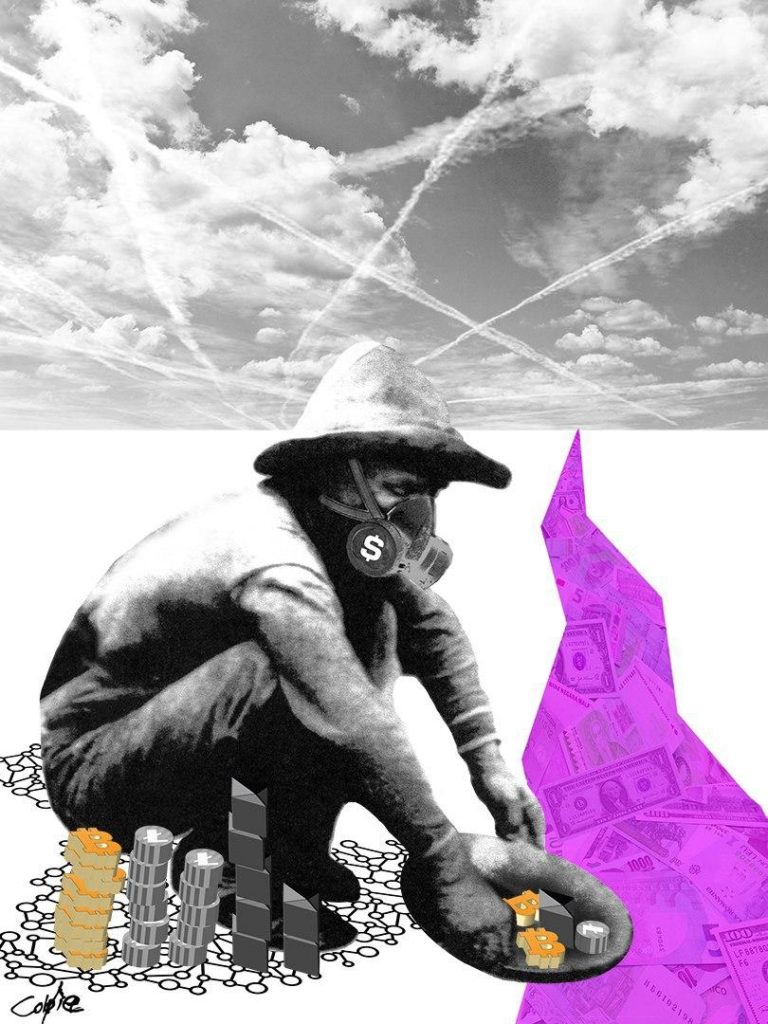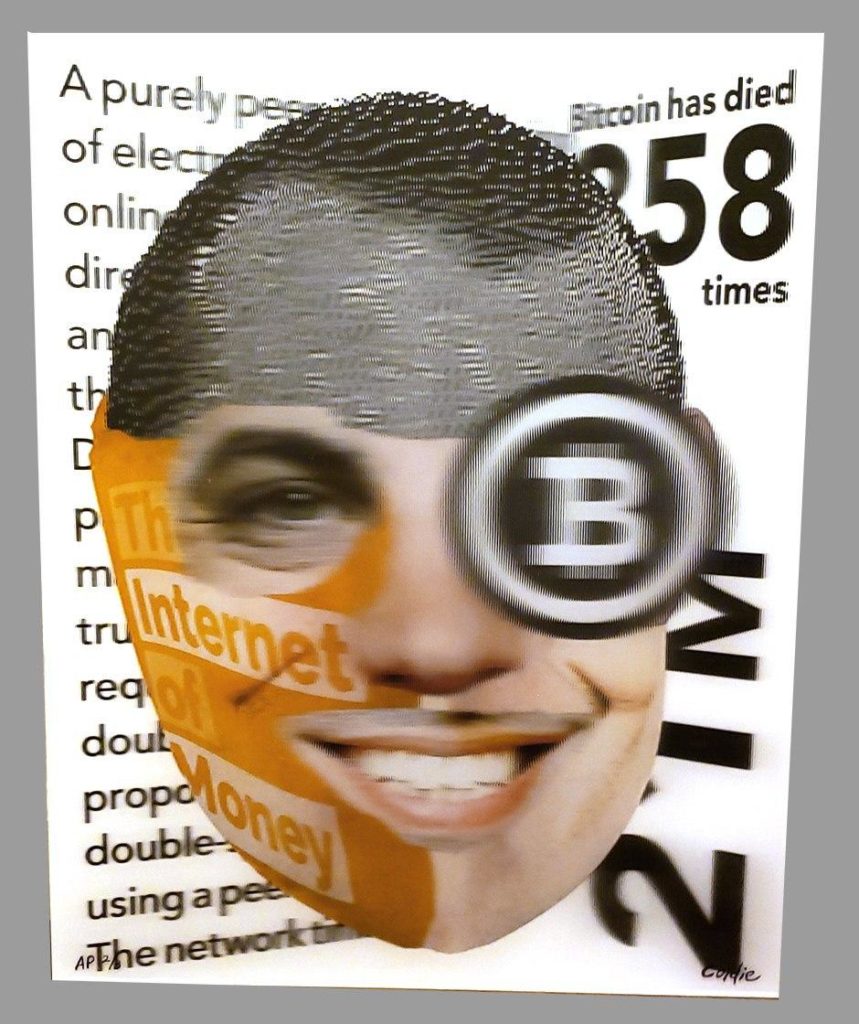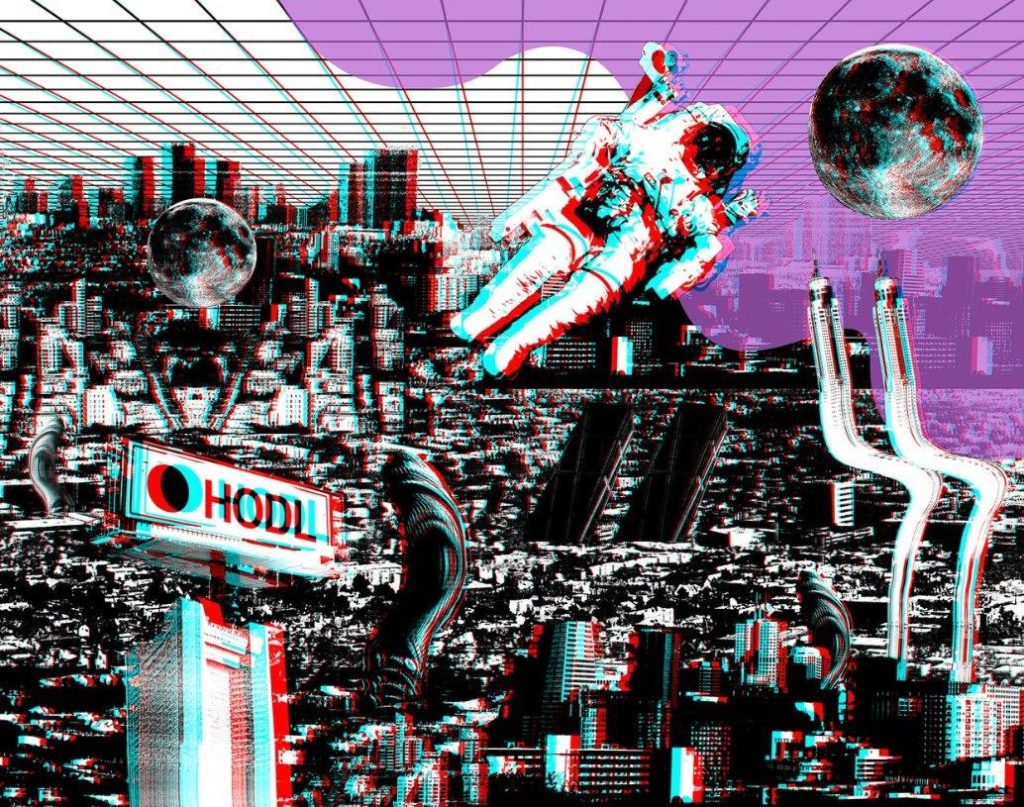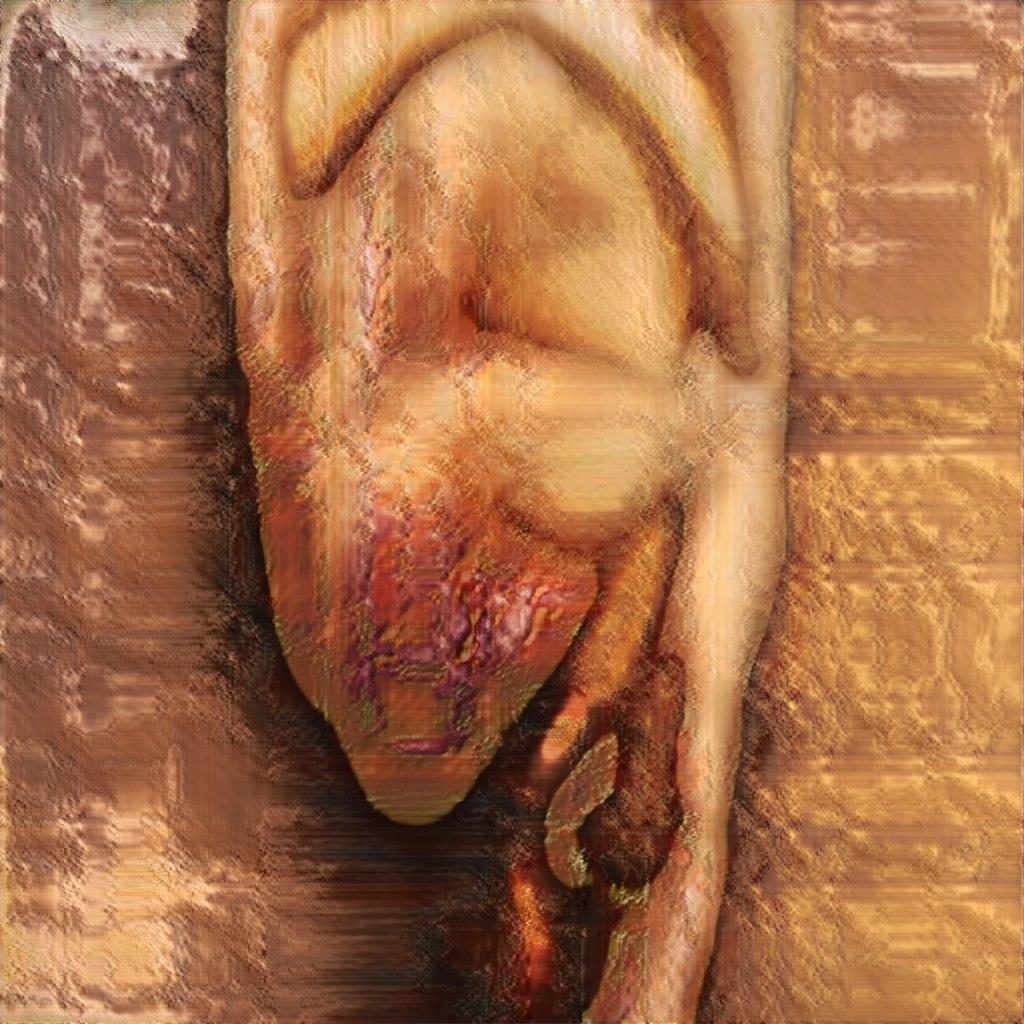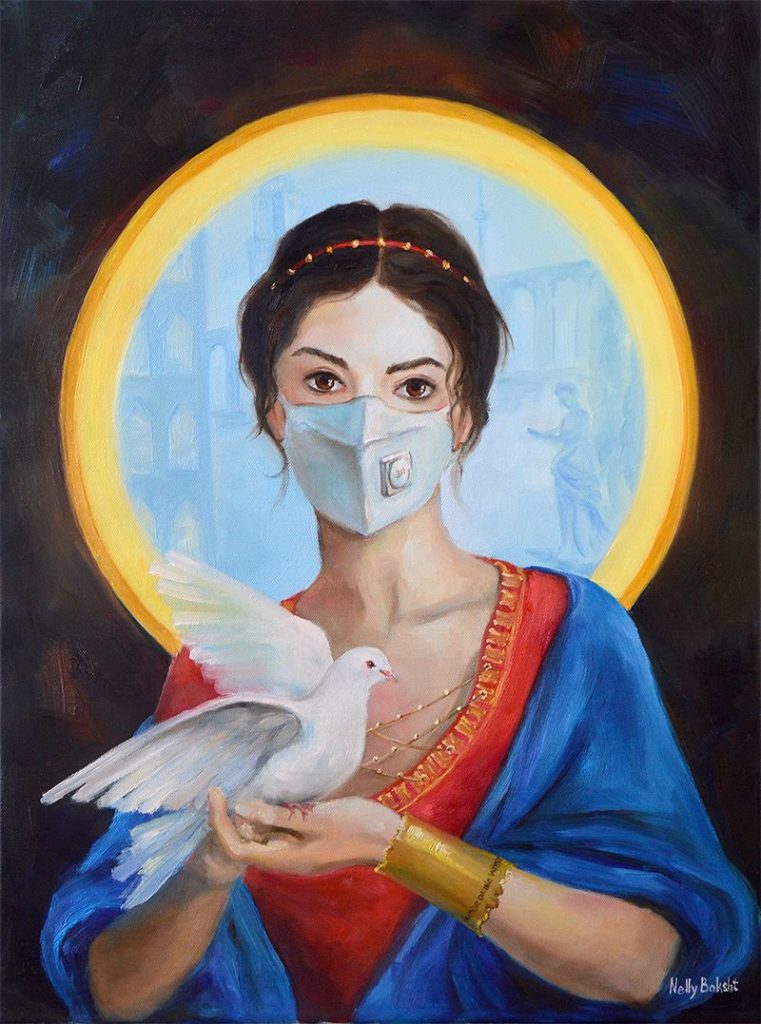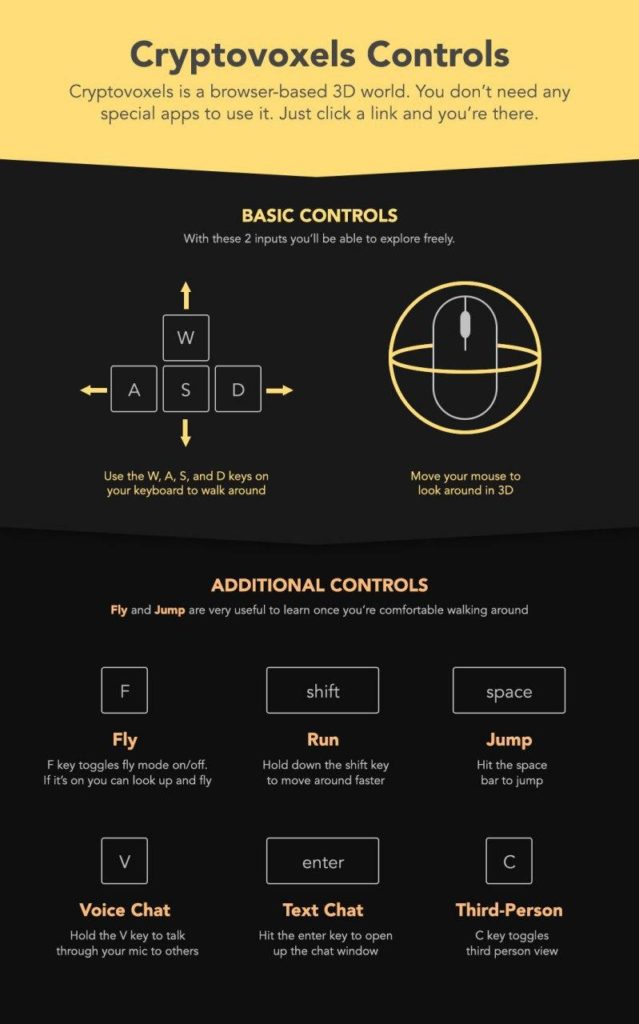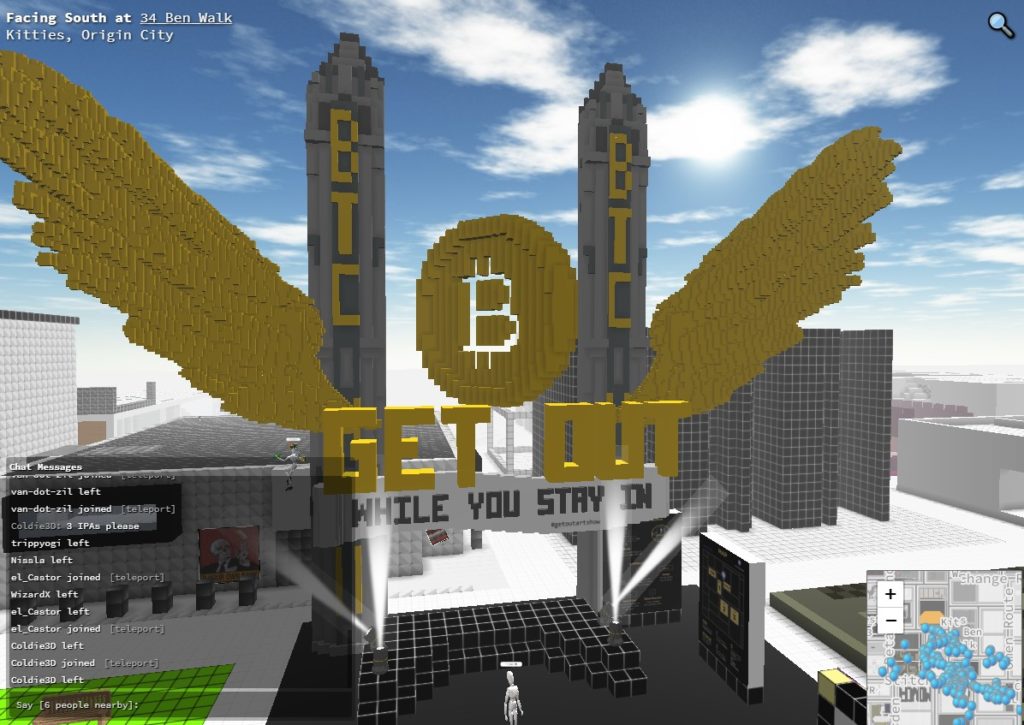The Citadel is the refuge of last resort. A fortress within the fortifications. Impenetrable, impregnable, inviolable, it’s where The Gatekeeper denies entry to the mere gatekeepers.
At least, it’s supposed to be.
Here in the virtual world of Cryptovoxels, crypto artist Coldie has reimagined the Citadel as a cozy art nook, where avatars sporting jetpacks and 3D goggles mingle over virtual cocktails.
There are no barriers to entry, no obligations to stay. Simply join the forty or so artists who have gathered to celebrate this emerging force in the art world, and whose use of blockchain technology has energized the digital art scene.
Sure, it’s built to look like a castle — and you have to pass through a menacing TSA-style ‘fiat detector’ to get in — but once inside, the atmosphere is convivial and welcoming.
Coldie has described the virtual exhibition as an opportunity to “stay in, and get out” — a chance to escape the physical and social walls we are erecting around ourselves during the coronavirus epidemic. As self-isolation in the era of a novel disease increases, he believes that opening our minds to new experiences isn’t just an optimal response. It’s a necessary one.
Welcome to Citadel 6.15
In 2013 a time traveler arrived from 2025, presaging a dystopian future in which governments had fallen, North Korea was one of the richest countries on Earth, and Bitcoin had basically screwed the entire world up for everybody.
Although the plot of the Bitcoin time traveler’s story on Reddit is essentially lifted wholesale from The Terminator, the concept of The Citadel as a refuge for the financial elite has persisted as a theme in crypto culture — along with the notion that 6.15 Bitcoins might be the “magic number” that permits… access. To bigger things.
Coldie’s exhibition celebrates a pair of memes that could easily be construed to have negative connotations, especially by those who know their history. But if there’s one thing artists love, it’s the negative space and the opportunity to hone in on a subject through exploiting the void around it.
In this instance, the void is the absence of human interaction itself.
“I was one of the featured artists at the Bitcoin 2020 conference in San Francisco and I know how much energy and passion we all put into that, so when it got postponed it was a gut punch to everyone. There were people flying in from the UK, from across the ocean, and they’re getting prints made, shipped… and suddenly they’re sitting on art that nobody’s gonna buy. There are repercussions. And I had access to this plot of land [in Cryptovoxels] that serendipitously I’d started developing — I just decided to do it. The art show’s still going on.”
Once he had developed the concept and started developing the three-building exhibition space, he says that other artists enthusiastically joined the project, bringing vitality and diversity to the show.
“If you happen to like cars, we have cars outside the entrance. There’s Bitcoin art, there’s abstract art, there’s interactive art, there’s physical art. There’s fucking art everywhere.”
The creator, the collector, the curator
Coldie himself has been interested in crypto art since 2017. Although he has a full-time job as an art director, he’s devoted a significant portion of his recent life to creating and collecting crypto art.
“All of my art purchases have been through a sale,” he says. And while sometimes it might take him ten sales to save the ETH necessary to buy a piece he wants to own, he explains that crypto art “gives me the ability to iterate and create art exponentially”, which in turn allows him to sell-to-buy more frequently.
He collects multiple artists’ works, refusing to go “all-in” on any particular artist, or even style. “It’s like early Warhol,” he suggests. “Like when he was doing newspaper illustrations. And you look at this and envision what it’s going to become. Anytime you’re investing in something there’s an exit strategy, and although I don’t buy to flip I do consider the cultural and historical significance of the piece.”
Coldie particularly enjoys GAN art — Generative Adversarial Network pieces, or to the layperson, art created by algorithms. A ‘generator’ algorithm creates an image. It could be a bus, it could be a human face. Its counterpart, a ‘discriminator’ is tasked with learning how to tell the artificial image from a real-life image. It compares the generated image to a database of real ones, and then informs the generator of its conclusion… thereby teaching the generator how better to fool it next time.
And along the way, art is created. Real art, the kind that sells for $432,500 at Christie’s auction house. “A Portrait of Edmond Belamy” fits Coldie’s standard for collectability perfectly, given its historical importance as the first piece of AI-generated artwork to go under the hammer.
“I spent maybe six sales’ worth of my earnings on a single piece from the Nudes collection by Robbie Barrat. The historical, technological… what it is, is the cornerstone piece that I wanted. It’s actually in my vault at the show. It’s the most I’ve ever paid for anything, but to my mind I created that money with my art, and it’s reinvested in art. So I’m selectively choosing important pieces, but it’s also art that strikes me, just like the ‘wow, that’s beautiful’, that visceral feeling that I can’t stop looking at this.”
He explains that another of his favorite pieces is Hope, by Nelly Baksht. Again, context is everything to Coldie: in this case, the artist created the piece in response to her negative test for the novel coronavirus, and she intends to auction the original 18”x24” oil-on-canvas to raise funds for a COVID-19 charity.
AI Generated Nude Portrait #7 Frame #153 – Robbie Barrat
Buying in, not selling out
Coldie explains that hosting an art show in a virtual world is about more than selling work. “If it was just going to be me and thirty of my friends hanging out, that would be perfectly fine.”
But with that said, there is always a commercial imperative if the artist wants to devote more of their time to their passion.
“Whenever I talk to people about crypto and art, I tell them: we are the most simple validation of a smart contract. Finance is looking and what we’re doing, and saying, well if it works for art, what about my property? My health insurance? It’s the same if / then statement. We’ve proved it for a couple of years. I think in the annals of blockchain, they’ll point to artists. Artists are leading the trend.”
And of course, at the Citadel 6.15 virtual exhibition plenty of collectors are expected to buy.
As I wander around the exhibit before it gets crowded (did I just say that?) I pause at multiple junctures, clicking on artworks to find out more about them and their creators.
Some give me the option of purchasing a limited edition non-fungible token (NFT) via one of the growing number of art platforms on the Ethereum blockchain, like SuperRare, OpenSea, or async.art. For these, I need a cryptocurrency wallet — and enough ETH to fund the purchase.
Others redirect me to the artist’s website, where I can buy physical pieces using traditional payment methods. To Coldie, the medium and the message are blurred lines. A virtual world can contain a digital reproduction of a physical oil painting that is copied to a print…
In some cases, there are auctions: both Josie Bellini and Matt Kane, two of the better-known artists in the space, are unveiling new works at Citadel 6.15.
Bellini is auctioning ‘(un)limited: Fed Monkey’ — a timely reflection on the trillions of dollars injected into the ailing U.S. economy, while Kane will preview a multi-layered piece, ‘Right Place & Right Time’, which is linked to the volatility of Bitcoin’s price and which mutates in accordance with an algorithm.
#GetOutArtShow
Using the hashtag #getoutartshow, Coldie has promoted the exhibition as a chance to “Get out, get out of your house, get out of your head, do something new.”
Visitors don’t need to create accounts, avatars, or wallets — as Coldie notes, the exhibition is open to anyone in the world with an internet connection and the desire to enjoy a stroll and maybe a chat with other inquisitive people.
The show will remain in the Cryptovoxels world for a couple of months before he has other plans for the space: supporting a charity art auction for the Kitty Bungalow Charm School for Wayward Cats, a feral cat rescue operation in Los Angeles. “Last year I brought in crypto people, like CryptoKitties, and I think we might have raised more than the physical art auction did!”
But over the weekend of March 27th to the 29th is when he expects most visitors, with artist and gallery representative appearances adding to the attraction. Following the March 26th pre-party, Ben Nolan of Cryptovoxels noted that “We’ve had large meetups before, but we’ve never had so many artists, creators and builders create art specifically for one event. The art they’ve created for the event is really fantastic, a wonderful outpouring of creativity, we’re really glad we can provide a platform for people to get together and connect.”
As a collector and artist, Coldie has a vested financial interest in promoting the crypto art space. But like fellow artist Robness, who told Cointelegraph Magazine this week that “At first you have to give yourself away a little bit to the public for them to just be able to see what you’re doing,” his motives stride beyond the purely monetary.
In fact, the social aspect of Citadel 6.15 overshadows the primary purpose of most art exhibitions — which is, in general, to promote artists.
Since it was built in the shadow of a global economic meltdown, during a period of unprecedented modern social distancing, Coldie explains instead that “I hope that somebody who is down, and super stressed out about this crazy situation… I hope that single person clicks the link, and it brings a smile to their face. If that happens to one person… if it brings a sense of community and love to any one person… that’s a win.”
That, he believes, will make the whole effort worthwhile.
Citadel 6.15 Artists Include:
| Async | Obaki AI |
| SuperRare | Fractal Encrypt |
| CryptoMotors | Roses |
| Age of Chains | Rah Crawford |
| Avastars | Upheaver |
| Coldie | Eburgami |
| Josie | Bigcomicart |
| JOY | Jason Bailey |
| Matt Kane | Trevor Jones |
| Lucho Polleti | Rutger Van Der Tas |
| n0shot – CryptoMotors Collection | Jsf |
| Conlan | DADA |
| Hackatao+Hex6c | Obvious |
| Giant Swan | Twisted Vacancy |
| giselx | Robness |
| Ekaitza | GusGG |
| Yonat Vaks | Johnny Dollar |
| Nelly Baksht | Tom Badley |
| RYR | Tommy |
| Ryan Seslow | mlibty |
| Alotta Money | Sparrow |
| Pascal Boyart | Pak |
| Martin Lukas Ostachowski | Shortcut |
| jivinci | Van |
| VESA | Opheliafu |
| Martin Fischer | Espen Kluge |
| Robbie Barrat | Chief Monkey |
| Pindar Van Arman | Hackatao |
| Yura Miron | Primal Cypher |
| XCOPY |
Citadel 6.15 Resources:
For the times and venues of artist appearances, see the exhibition spreadsheet here.
You do not need any special software or an account to visit the Citadel 6.15 exhibition in the Cryptovoxels virtual world.
You will, however, need a Web 3.0 Ethereum wallet to bid on certain works.
Cryptovoxels documentation on how to get a name for your avatar and more can be found here.
The Brave internet browser comes with a default wallet. Instructions for using it can be found here.
(Note that when using Brave, it may automatically open wallet windows. You can safely close those unless you are bidding or purchasing.)
There is also a mobile app and extension for other browsers, MetaMask.
SuperRare has a guide to buying here.
OpenSea has a similar guide here.
async.art can be found here.
KnownOrigin can be found here.



